
 |
||||||
|
GAY
FILM REVIEWS BY MICHAEL D. KLEMM
|
||||||
|
The 24th Day Screen Media Fims, Director/Screenplay: Starring: Rated R, 92 minutes |
Tie
Me Up Tie Me Down
The 24th Day (2004) is a film about responsibility, revenge and redemption. Things get ugly when two men, who tricked five years earlier, hook up again. Director Tony Piccirillo's adaptation of his 1996 play is part cautionary tale and part thriller. |
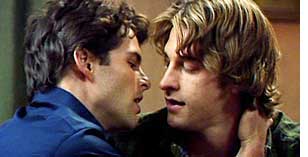 Tom
(Scott Speedman) is a straight man who has discovered that he is HIV positive.
He had sex with a man once and assumes that he could only have contracted
the virus when they shared a drunken one night stand. Tom haunts the gay
bars, looking for him. One night, Tom sees him. Dan (James
Marsden) is a party boy; cute, funny, personable and horny. He doesn't
remember Tom and he is about to go home with the wrong guy. Tom
(Scott Speedman) is a straight man who has discovered that he is HIV positive.
He had sex with a man once and assumes that he could only have contracted
the virus when they shared a drunken one night stand. Tom haunts the gay
bars, looking for him. One night, Tom sees him. Dan (James
Marsden) is a party boy; cute, funny, personable and horny. He doesn't
remember Tom and he is about to go home with the wrong guy. |
|
|
|
|
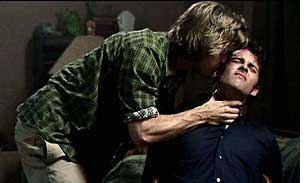 Tom
tells Dan that, 24 days ago, he tested positive and that he is the
only one who could possibly have infected him. Tom doesn't believe Dan when
he says that he used a condom that night five years ago. Dan was so drunk
that he doesn't remember Tom; how could he possibly remember if he wore
a condom? Tom takes a vial of Dan's blood. He will bring the blood to a
friend at a clinic so that it can tested for AIDS. If the test comes back
positive, Tom tells his bound and gagged captive, he will kill him. Tom
tells Dan that, 24 days ago, he tested positive and that he is the
only one who could possibly have infected him. Tom doesn't believe Dan when
he says that he used a condom that night five years ago. Dan was so drunk
that he doesn't remember Tom; how could he possibly remember if he wore
a condom? Tom takes a vial of Dan's blood. He will bring the blood to a
friend at a clinic so that it can tested for AIDS. If the test comes back
positive, Tom tells his bound and gagged captive, he will kill him. |
|
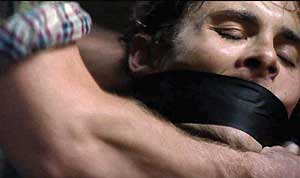 The
24th Day
is a nifty and suspenseful game of cat and mouse. It is mostly a two hander
and the two leads are up to the challenge. The bulk of the film is set in
the apartment to preserve the intimacy of its stage production. Before anyone
calls that a negative, or the film "stagy," Piccirillo was savvy enough
to utilize a few cinematic tricks when he transferred his play to celluloid.
Jump cuts are employed during selected moments of dialogue. Overexposed,
silent flashbacks help flesh out Tom's backstory. The camera does
leave the apartment from time to time, and the film opens in a bar. The
claustrophobic photography inside the apartment is reminiscent of Polanski.
Dan's two escape attempts provide more than enough sufficient "action." The
24th Day
is a nifty and suspenseful game of cat and mouse. It is mostly a two hander
and the two leads are up to the challenge. The bulk of the film is set in
the apartment to preserve the intimacy of its stage production. Before anyone
calls that a negative, or the film "stagy," Piccirillo was savvy enough
to utilize a few cinematic tricks when he transferred his play to celluloid.
Jump cuts are employed during selected moments of dialogue. Overexposed,
silent flashbacks help flesh out Tom's backstory. The camera does
leave the apartment from time to time, and the film opens in a bar. The
claustrophobic photography inside the apartment is reminiscent of Polanski.
Dan's two escape attempts provide more than enough sufficient "action." |
|
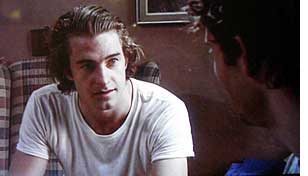 The
central conflict might stretch believability for some but there is no way
to predict human nature. Anger can turn even a milquetoast into a monster
and Tom has cause to be angry. We will learn that Tom was married and that
his wife was ill. Upon learning that her condition arose from AIDS complications,
she crashed her car and was killed. Suicide is implied. When Tom then had
himself tested, and the results came back positive, he was convinced that
his wife caught it from him. But nothing is black and white. Dan is quick
to point out that she was the one who was sick and that she
could have given it to him. The
central conflict might stretch believability for some but there is no way
to predict human nature. Anger can turn even a milquetoast into a monster
and Tom has cause to be angry. We will learn that Tom was married and that
his wife was ill. Upon learning that her condition arose from AIDS complications,
she crashed her car and was killed. Suicide is implied. When Tom then had
himself tested, and the results came back positive, he was convinced that
his wife caught it from him. But nothing is black and white. Dan is quick
to point out that she was the one who was sick and that she
could have given it to him. |
|
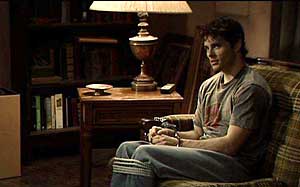 Tom
is unmoved and tells Dan that he has to be held accountable. "We fooled
around five years ago," Dan shouts, "What do I have to be accountable for?"
Dan insists that he is always safe, but he has already been caught lying.
Much of their dialogue revolves around what constitutes the truth. Dan's
lies aren't necessarily malicious but they are falsehoods nonetheless.
Because he lies so easily, it is easy to disbelieve him when he insists
that he has been tested for AIDS. "Everyone has their own truth," Tom insists.
"But the only truth that matters is the true truth. Not what you say, or
what I say, but what really is." Tom
is unmoved and tells Dan that he has to be held accountable. "We fooled
around five years ago," Dan shouts, "What do I have to be accountable for?"
Dan insists that he is always safe, but he has already been caught lying.
Much of their dialogue revolves around what constitutes the truth. Dan's
lies aren't necessarily malicious but they are falsehoods nonetheless.
Because he lies so easily, it is easy to disbelieve him when he insists
that he has been tested for AIDS. "Everyone has their own truth," Tom insists.
"But the only truth that matters is the true truth. Not what you say, or
what I say, but what really is." |
|
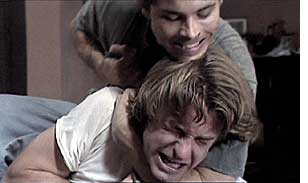 The
grimmer aspects to their situation aren't forgotten. For example, Dan soils
himself while Tom soundly sleeps a few feet away. "Do you think my bodily
functions just stop?" Dan asks as the two bicker like a married couple.
Dan attempts to exploit this bathroom episode and tries to escape, nearly
strangling his captor with a TV cord before being overpowered again as he
tries to break out of the apartment. The tension between them is often broken
up with humor. "Are you still mad at me?" Dan asks, the next day. "I'm a
hostage! You're supposed to expect this kind of behavior from us." When
Tom doesn't respond, Dan continues, "I could have left you for dead but
I didn't. You should be thanking me." The
grimmer aspects to their situation aren't forgotten. For example, Dan soils
himself while Tom soundly sleeps a few feet away. "Do you think my bodily
functions just stop?" Dan asks as the two bicker like a married couple.
Dan attempts to exploit this bathroom episode and tries to escape, nearly
strangling his captor with a TV cord before being overpowered again as he
tries to break out of the apartment. The tension between them is often broken
up with humor. "Are you still mad at me?" Dan asks, the next day. "I'm a
hostage! You're supposed to expect this kind of behavior from us." When
Tom doesn't respond, Dan continues, "I could have left you for dead but
I didn't. You should be thanking me." |
|
 There
is no clear villain and it's difficult to side with one man over the other.
Which one of them has been more victimized? Over the course of the
film, their characters are gradually revealed. Dan is a likable guy; he
has probably relied on his charm in the past to get himself out of trouble
and he is now facing the biggest challenge of his life. Tom is not a bad
person but he is upset and angry, and has been pushed over the edge. Tom
has no business taking Dan hostage but eventually you understand why
is doing it. That doesn't excuse his behavior but, if he is right about
Dan, then Dan should be held accountable, in some way at least,
for his lapse in judgment. There really are no black or white hats in this
story. There
is no clear villain and it's difficult to side with one man over the other.
Which one of them has been more victimized? Over the course of the
film, their characters are gradually revealed. Dan is a likable guy; he
has probably relied on his charm in the past to get himself out of trouble
and he is now facing the biggest challenge of his life. Tom is not a bad
person but he is upset and angry, and has been pushed over the edge. Tom
has no business taking Dan hostage but eventually you understand why
is doing it. That doesn't excuse his behavior but, if he is right about
Dan, then Dan should be held accountable, in some way at least,
for his lapse in judgment. There really are no black or white hats in this
story. |
|
|
The AIDS/revenge scenario probably would have been more of a shocking horror story in the 1980s or the early 1990s, but it still works today. In closing, here is a bit of trivia for anyone who is interested: ER's Noah Wylie played Dan in the original stage production.
James Marsden
also appears in: |